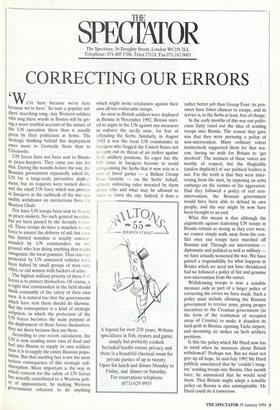SPCTAT THE
E OR
The Spectator, 56 Doughty Street, London WC1N 2LL Telephone: 071-405 1706; Telex 27124; Fax 071-242 0603
CORRECTING OUR ERRORS
CWe're here because we're here because we're here.' So runs a popular sol- diers' marching song. Any Western soldiers who sing these words in Bosnia will be giv- ing a more truthful account of the nature of the UN operation there than is usually given by their politicians at home. The strategic thinking behind this deployment owes more to Gertrude Stein than to Clausewitz.
UN forces have not been sent to Bosnia as peace-keepers. They came too late for that. During the months before the war, the Bosnian government repeatedly asked the UN for a large-scale preventive deploy- ment, but its requests were turned down; and the small UN force which was present in Sarajevo at the outbreak of the war was swiftly withdrawn on instructions from Dr Boutros Ghali.
Nor have UN troops been sent to Bosnia as peace-makers. No such general mandate has yet been passed by the Security Conn cll. These troops do have a mandate to use force to ensure the delivery of aid; but rveu this limited mandate is usually counter- manded by UN commanders on the ground, who fear doing anything that might antagonise the local gunmen. Thus convoys protected by UN armoured vehicles have been halted by small groups of men with rifles, or old women with buckets of urine.
The highest military priority of these 1 IN forces is to protect themselves. Of course, it is right that commanders in the field should think constantly of the safety of their own men. It is natural too that the governments which have sent them should do likewise. But the consequence is a kind of strategic solipsism, in which the protection of the UN forces becomes the main purpose of the deployment of those forces themselves: they are there because they are there. According to one recent calculation, the UN is now sending more tons of food and fuel into Bosnia to supply its own soldiers than it is to supply the entire Bosnian popu- lation. But that startling fact is not the most serious consequence of this strategic self- absorption. More important is the way in which concern for the safety of UN forces has actually contributed to a Western poll- CY of appeasement, by making Western governments reluctant to do anything which might invite retaliation against their own all-too-vulnerable troops.
As soon as British soldiers were deployed in Bosnia in November 1992, Britain start- ed to argue in the UN against any measures to enforce the no-fly zone, for fear of offending the Serbs. Similarly, in August 1993 it was the local UN commander in Sarajevo who begged the United States not to carry out its threat of air strikes against Serb artillery positions. So eager has the UN force in Sarajevo become to avoid antagonising the Serbs that it now acts as a suit of hired gaoler — a Balkan Group lour Security — on the Serbs' behalf, actively enforcing rules invented by them .about who and what may be allowed to cuter or leave the city. Indeed, it does a rather better job than Group Four: its pris- oners have fewer chances to escape, and its service is, to the Serbs at least, free of charge.
In the early months of this war our politi- cians flatly ruled out the idea of sending troops into Bosnia. The reason they gave was that they were pursuing a policy of non-intervention. Many ordinary voters instinctively supported them for that rea- son, having no wish for Britain to 'get involved'. The instincts of those voters are worthy of respect; but the illogicality (and/or duplicity) of our political leaders is not. For the truth is that they were inter- vening from the start, by imposing an arms embargo on the victims of the aggression. Had they followed a policy of real non- intervention, the Bosnian government would have been able to defend its own people, and the war might by now have been brought to an end.
What this means is that although the arguments against stationing UN troops in Bosnia remain as strong as they ever were, we cannot simply walk away from the con- flict once our troops have marched off Bosnian soil. Through our intervention diplomatic and political as well as military we have actually worsened the war. We have gained a responsibility for what happens in Bosnia which we need not have shouldered had we followed a policy of fair and genuine non-intervention from the outset.
Withdrawing troops is now a sensible measure only as part of a larger policy of correcting the errors we have made. Such a policy must include allowing the Bosnian government to receive arms; giving proper incentives to the Croatian government (in the form of the restitution of occupied areas of Croatia) to make it abandon its land-grab in Bosnia; opening Tuzla airport; and mounting air strikes on Serb artillery positions.
Is this the policy which Mr Hurd now has in mind when he murmurs about British withdrawal? Perhaps not. But we must not give up all hope. In mid-July 1992 Mr Hurd publicly announced that he 'couldn't imag- ine' sending troops into Bosnia. One month later, he announced that he would send them. That Britain might adopt a sensible policy on Bosnia is also unimaginable. Mr Hurd could do it tomorrow.


































































 Previous page
Previous page